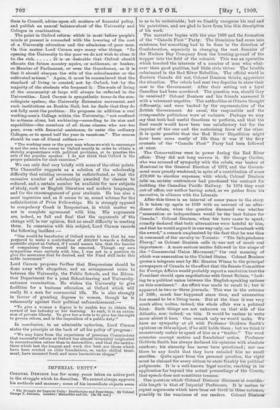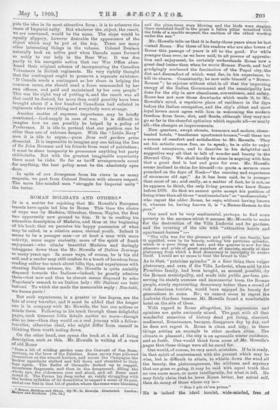IMPERIAL UNITY.*
COLONEL Disinson- has for, many years taken an active part in the struggle which he describes. We cannot always approve his methods and manner; some of his immediate objects seem * The Struggle for Divpsrial Unity ? Thoollections and Experiencss. By Colonel George T. Denison. London; Macmillan and Co. [Si. 05. net.]
to us to be undesirable; but we frankly recognise his zeal and his patriotism, and are glad to have front him this description of his work.
The narrative begins with the year 1808 and the formation of the "Canada First" Party. The Dominion had come into existence, but something had to be done in the direction of Confederation, especially in changing the vast domains of the Hudson Bay Company from the hunting-ground of the trapper into the field of the colonist. This was an operation which touched the interests of a number of men who, what- ever their good qualities, had little civic virtue. The trouble
culminated in the Red-River Rebellion. The official world in
Eastern Canada did not, Colonel Denison thinks, appreciate the situation. The rebels had sent two deputies to state their
case- to the Government. After their setting out a loyal Canadian had 'been murdered. The question was, should they be received? Colonel Denison, and his friends answered it
with a vehement negative. The authorities at Ottawa thought differently, and were backed by the representative of the British Government. As usual, the responsible and the irresponsible politicians were at variance. Perhaps we may say that both-had useful functions to perform, and that the final result would have been less satisfactory but for the
impulse of- the one and the restraining force of the other. Ibis quite possible that the Red River Expedition- might have been more costly of life than it was if ' the fiery counsels of the "Canada First" Party had been followed at - once.
The Conservatives were in power during the Red River affair. They did not long survive it. Sir George Cartier,
who was accused- of -sympathy with the rebels, was beaten at
Montreal in the General Election of 1872, and the Govern- ment were greatly weakened, in spite of a contribution of some 270,000 to election expenses, with which, Colonel Denison tells us, certain contractors had purchased the contract for building the Canadian Pacific Railway. In 1874 they went out of office, our author having acted, as we gather from his narrative, in alliance with the Liberals.
After this there is an interval of some years in the story. Ibis taken, up again in 1880 with an account of an after-
dinner debate, when the question discussed was whether :" annexation or independence would be the best future for Canada." Colonel Denison, when his turn came to speak, roundly declared that both alternatives were hateful to him, and that he would argue it in-one way only, on." horseback with the evrord," a remark emphasised by tlse fact- that he was then
iâ command of the cavalry in -Toronto. "The Independence
Flurry," as Colonel Denison calls it, was- not of much real importance. A more serious matter followed in the shape of the "Commercial Union Movement," the real meaning of which was annexation- to the United States. Colonel Denison quotes a telegram sent by Mr. Etastus Winan to the principal newspapers of Canada to the effect that the Senate Committee
for Foreign Affairs would probably report a resolution that the President should open negotiations with Great Britain, " look- ing-to- a political union between the English-speaking nations
on this 'continent." An effort was made to recall it; but it appeared-in two or three journals. This was in the autumn of 1888; much has- happened since then, and annexation
has ceased to be a Biting isstte. But at the time it was very much alive; unless,- indeed,- the whole affair was a political feint. Such things' are not unknown on that side of the
Atlantic, nor, indeed, on this. It would be useless to write more- about it here. One remark only we would make. We have no sympathy at all with Professor Goldwin Smith's opinions on this subject, if he still holds them ; but we think it
monstrously unfair to speak of him as a "traitor." The word connotes corrupt motive and fraudulent action. Professor Goldwin Smith has always declared his opinions with absolute candour; his sincerity has - never been qtestioned ; nor can- 'there be any doubt that they have entailed him no small sacrifice. Qtlite apart from the personal question, the right 'must be claimed for every citizen to state frankly his political -judgments. It--is a well-known legal maxim, reaching in its applicationfar'beyond the aetual proceedings of the Courts, that speech does not constitute treason; One queStidn whielt .Colonel Denison discueses 'at consider- able length is that of Imperial Preference. It is useless to repeat arguments which have been set forth in thi3se columns, possibly to the weariness of our readers. Colonel Denison' puts the idea in its most attractive form : it is to subserve the cause of Imperial unity. But whatever the object, the result, we are convinced, . would be the same. The elope would be equally slippery, . however desirable the appearance of the object which may be put . at the top. There are many other interesting things in the volume. Colonel Denison naturally took an active part when Canada came forward so nobly to our help in the Boer War. It was due partly to his energetic action that our War Office aban- doned their original scheme of. incorporating the Canadian Volunteers in British regiments. He very rightly thought that the contingent ought to preserve a separate existence. "If Canada sends a contingent as her share in helping. the common cause, she should send a force commanded by her own officers, and paid and maintained by her own people." This was the right way of putting it, and the result was all that could be desired, far more than could possibly have been brought about if a few hundred Canadians had enlisted in .regiments where everything and everybody were strange.
Another matter of supreme importance may be briefly mentioned,—food-supply in case of war. It is difficult to imagine how we can possibly be helped by a policy of Preference. It is idle to pretend that our position can be other than one of extreme danger. With the "Little Navy" men it is idle to argue,—quem Deus .vult perdere prius :dementat. It is impossible to imagine any one taking the line of Sir John Brunner and his friends from want of patriotism ; it must be sheer incapacity to pronounce anything but party shibboleths. But with the greatest imaginable superiority there must be risks. So far as tariff arrangements count for anything, the best policy must be the absolutely open door.
In spite of our divergence from his views in so many respects, we part from Colonel Denison with sincere respect. The more like-minded men "struggle for Imperial unity" the better.











































 Previous page
Previous page